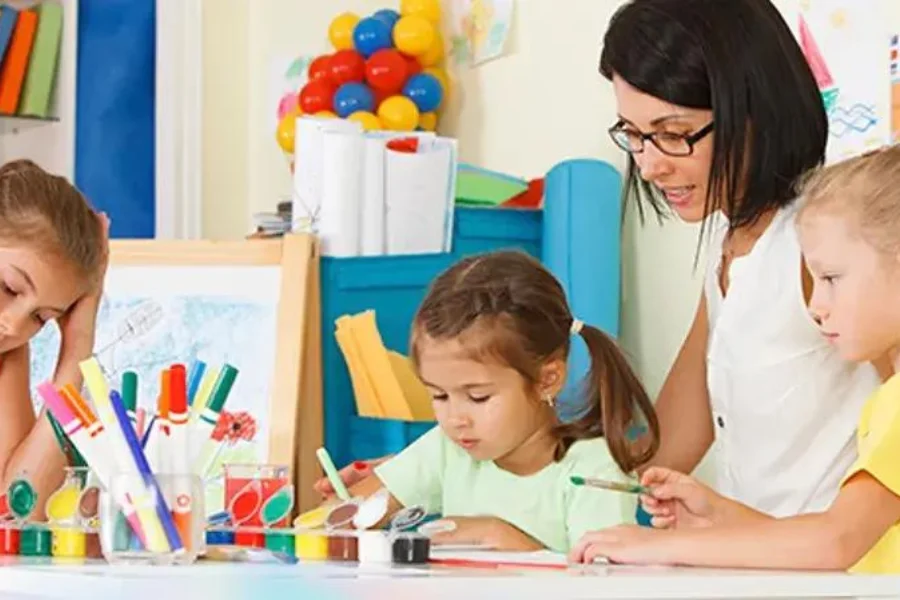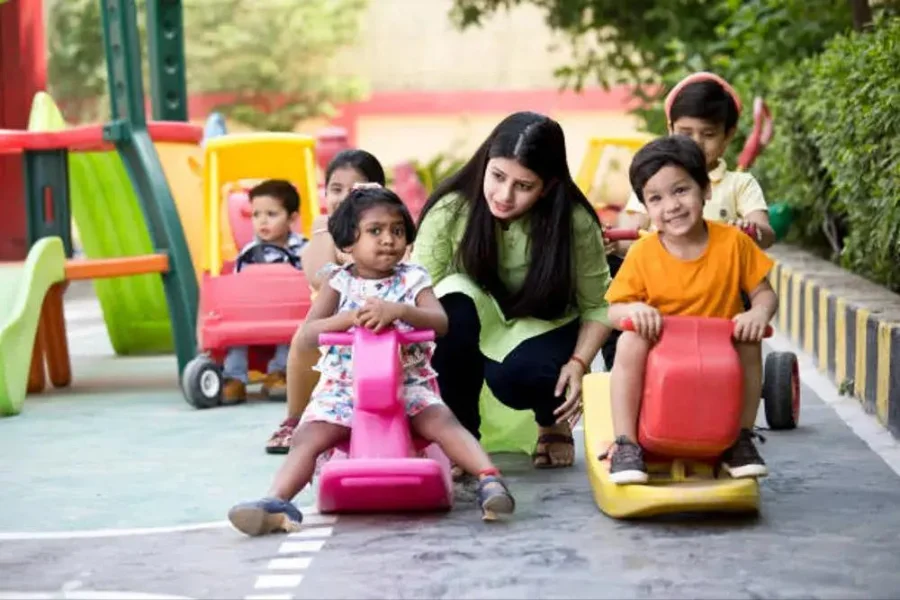What are Preschool Milestones?

Source: shutterstock
What are Preschool Milestones?
Preschool Milestones are physical, social, and academic development stages that a child goes through. Children achieve milestones in areas like language, social interaction, and motor skills. These achievements help to track the progress of children in their early years.
Preschool milestones begin at the of three, when children learn to say certain words and even sentences, around five years they start counting numbers and understand basic concepts. These crucial milestones and achievements mark the child’s overall growth, helping parents and educators to apply teaching methods consequently.
For more information of PPTTC Course Call / Whatsapp on +919869546913 / +919869866277
To download brochure of PPTTC Course, Click Here!
Table of Content

Source: kidsandcribschildcare
What are Developmental Preschool Milestones?
Preschool milestones include physical, emotional, cognitive, and social progress. Understanding these stages helps caregivers support and guide a child’s growth.
Here are some important aspects of developmental preschool milestones:
Physical Development
- Climbing, Walking, running, jumping.
- Leading an active lifestyle and developing healthy habits.
Emotional Development
- Experiencing a range of emotions and learning to manage them,
- Milestones in emotional growth are influenced by environment, genetics, and parental experiences.
Cognitive Development
- Developing an understanding of concepts like size, shape, and time,
- Exploring the environment to learn and reason.
Social and Emotional Development
- Learning to share toys and interact with others,
- Developing empathy through gestures like helping or comforting peers.
- Engaging in joint play activities.
Language and Communication
- Learning by imitating the behavior of others or adults.
- Communicating needs, feelings, and desires with growing clarity.
Motor Skills
- Improving fine and gross motor skills, allowing greater mobility.
Cognitive Milestones
Gaining the ability to solve simple problems and learn new things.
Developmental Services
Regular monitoring of developmental milestones and discussion of any concerns with the child’s healthcare provider is crucial in the Early Development of Children to ensure providing necessary support.
These milestones also indicate any concerns or challenges a child may face, providing an understanding to educators to modify teaching methods and provide accurate support in learning.

Source: tribuneindia
What are Social Milestones for Pre-schoolers?
Social milestones for preschoolers are the level of capability of children to interact with others and understand social situations. These milestones prepare children to manage emotions and develop meaningful relationships. Social milestones for preschoolers include a variety of behaviors and skills that evolve as they grow.
Here are some key milestones for different ages:
Age 3
Pretend Play
Children engage in imaginative play, using dolls, animals, and objects to represent something else, like pretending a block is a phone.
Socialising
When collaborating and playing with other children they build social interaction, trust, and friendships. which is a crucial Social Milestones for Pre-schoolers.
Sharing and Taking Turns
At this age, children begin to understand the concept of sharing toys and taking turns in simple games.
Consideration
Young children at this age develop a connection with each other and develop empathy.
Age 4
Social-emotional Development
By observing and imitating adults, children build social-emotional skills at this stage.
Articulating Feelings
Children can communicate their thoughts and feelings with words, helping them navigate social interactions.
Creative Play
During this age, children develop more understanding of complex play involving detailed storylines and roles.
Analysing Emotions
Around four years young children start to understand and interpret the emotions of others, which aids in creating better connections.
Thinking Ahead
Children start to think ahead about their actions and the consequences of their behavior.
Understanding Cause and Effect
At this age, children learn from the experiences of themselves and others and begin to understand the idea that actions have consequences.
These social milestones achieved by children at different years of age shape their emotional well-being and future relationships. Understanding the stages of social milestones of young children helps teachers to support the development journey effectively.
What is the Best Way to Teach Pre-schoolers?
Teaching Preschoolers requires effective strategies and an engaging environment that supports their love for learning. The best method to teach young children is through creating a lesson plan and activities that include play-based learning like storytelling, drawing, treasure hunt, and lots more. During the formative age, children develop physical and cognitive skills, making it vital for educators to approach teaching with patience and creativity.
Here are some of the Best Way to Teach Pre-schoolers:
Interactive Learning
Interactive learning is a great way to teach young children activities like storytelling, drawing, and building with blocks. This type of teaching encourages fun while learning and fosters critical thinking. Creative learning encourages children to explore the environment.
Repetition of learning
Repeating activities reinforces learning and strengthens memory. With constant reoccurrence of lessons or activities helps children to stay focused and remember the concepts for a lifetime.
Positive Support
Encouraging children with rewards for their positive efforts and behaviors rather than just outcomes. Positive feedback helps build their confidence and motivation.
Encouraging Social Interface
Group activities allow students to interact with each other and work in a collaborative approach. Children build social skills and confidence from an early age.
The Preschool Teacher Training Course is valuable training for becoming a proficient preschool educator. This program prepares aspiring teachers with the skills to apply best teaching practices to support preschooler’s learning needs. The training ensures that teachers understand how to balance fun with educational goals, making learning enjoyable while also supporting the developmental needs of children.
Vidhyanidhi Education Society (Govt. Regd.) institute that offers the best training in PPTTC Courses to engage young students and create a positive learning environment. The course covers diverse teaching ways to design age-appropriate activities that enhance learning and support overall development. For aspirants, the Preschool Teacher Training course is a great way to learn the in-depth psychology of Preschool Milestones and provides all the necessary tools to teach preschoolers in an engaging and impactful way.
“Shape young minds with Vidhyanidhi Education Society’s PPTTC Course start your journey today!”
For more information of PPTTC Course Call / Whatsapp on +919869546913 / +919869866277
To download brochure of PPTTC Course, Click Here!
FAQs
What is your Favourite Part of Teaching Pre-Schoolers?
Children achieving their development and social milestones is the best part of teaching pre-schoolers.
What is Preschool Teaching?
Preschool teaching is providing early care and education to children aged 2-5 years, developing their physical growth and academic learning.




